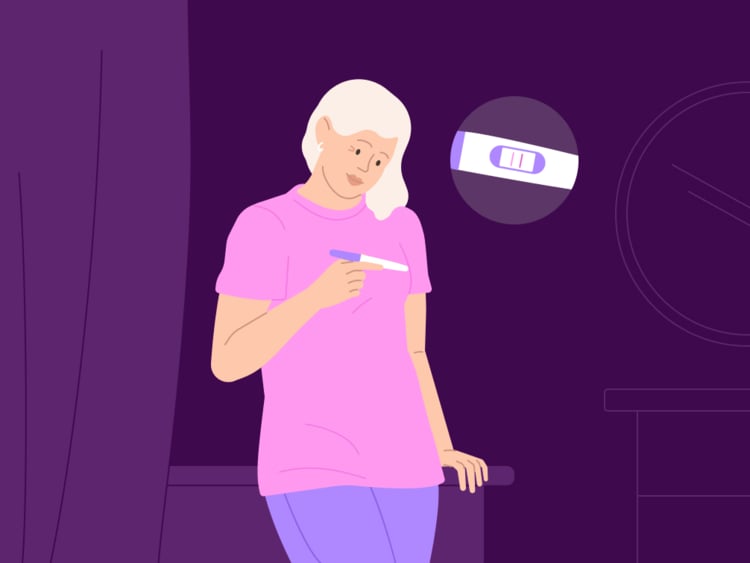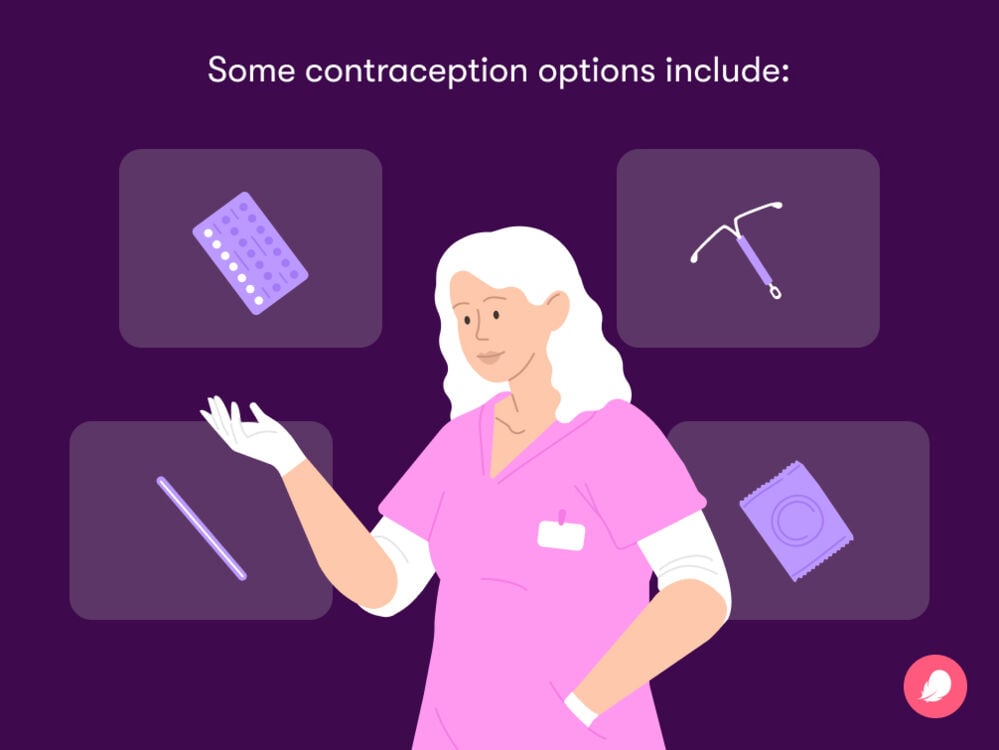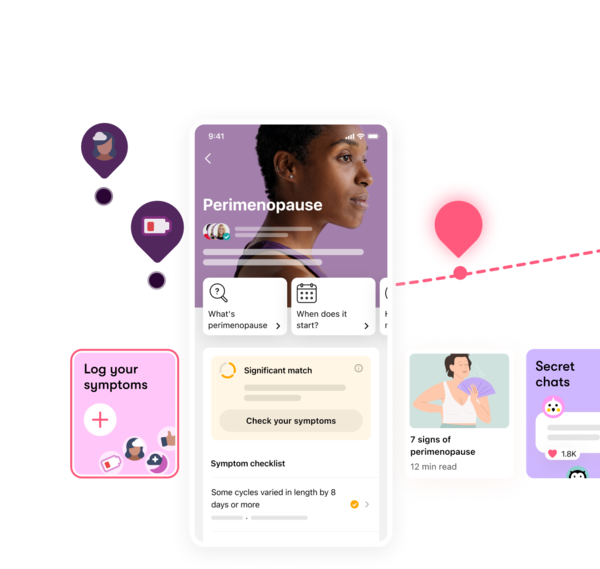We bust the most common myths and reveal the truths about your pregnancy chances in perimenopause.
-
Tracking cycle
-
Getting pregnant
-
Pregnancy
-
Help Center
-
Flo for Partners
-
Anonymous Mode
-
Flo app reviews
-
Flo Premium New
-
Secret Chats New
-
Symptom Checker New
-
Your cycle
-
Health 360°
-
Getting pregnant
-
Pregnancy
-
Being a mom
-
LGBTQ+
-
Quizzes
-
Ovulation calculator
-
hCG calculator
-
Pregnancy test calculator
-
Menstrual cycle calculator
-
Period calculator
-
Implantation calculator
-
Pregnancy weeks to months calculator
-
Pregnancy due date calculator
-
IVF and FET due date calculator
-
Due date calculator by ultrasound
-
Medical Affairs
-
Science & Research
-
Pass It On Project New
-
Privacy Portal
-
Press Center
-
Flo Accuracy
-
Careers
-
Contact Us
Myths and truths about pregnancy during perimenopause


Every piece of content at Flo Health adheres to the highest editorial standards for language, style, and medical accuracy. To learn what we do to deliver the best health and lifestyle insights to you, check out our content review principles.
Having a baby is something many of us end up waiting a little longer to do these days. Some people want to gain more life experience or advance in their careers first, others are limited by finances, and finding the right partner isn’t always as simple as it’s made out to be. For these reasons and plenty more, 20% of women in the United States now have their first child after the age of 35.
You’ve probably heard that your fertility gradually starts to decline from your mid-to-late 30s, before eventually stopping altogether when you hit menopause (which is your last ever period). Exactly when that will be is different from person to person. But there’s a process of transition through menopause — called perimenopause — which usually starts anywhere between four and eight years before menopause happens. So what’s the deal with getting pregnant if you’re in perimenopause?
If you think perimenopause might be starting and you want to have a baby, you might have some questions about your chance of conceiving. Here, Dr. Amanda Kallen, a reproductive endocrinologist and associate professor of obstetrics, gynecology, and reproductive endocrinology at Yale University School of Medicine, Connecticut, US, busts the most common myths and reveals the truths about your pregnancy chances in perimenopause.
As always, if you have questions or concerns about any health issue, reach out to your doctor for more personalized advice.
Key takeaways
- During perimenopause, you still have a chance of getting pregnant every cycle. However, your cycles may be less predictable than you’re used to as your body transitions through menopause.
- Even if your periods are irregular, it’s possible to ovulate (when your ovary releases an egg), which means you can still get pregnant.
- To avoid an unplanned pregnancy, you will need to use contraception until you have officially reached menopause (you’ll know this for certain when you go 12 months without a period).
Can I get pregnant during perimenopause?
We’re often led to believe that you can’t get pregnant after 40 without the help of fertility treatment. And while fertility and age are closely connected, that’s not always the case. It is possible to get pregnant in your 40s. Some people might already be in perimenopause by the time they reach 40, while others won’t.
Before we get into it, you might be new to the term perimenopause. The first thing to know is that it’s different from menopause. “Perimenopause is the transitional phase [through] menopause, during which a woman’s body has few eggs remaining and is beginning to produce less [of the hormones] estrogen and progesterone,” explains Dr. Kallen. Most commonly, perimenopause happens in your 40s but can start anywhere between your mid-30s and 50s.
Menopause — which is your last ever period — then happens “when the ovaries essentially run out of eggs,” says Dr. Kallen. When you haven’t had a period for 12 months, you’re considered to have gone through menopause. That usually happens between the ages of 45 and 55. From then on, you are postmenopausal and won’t be able to get pregnant without fertility treatment.
So, how is it possible to get pregnant during perimenopause but not after menopause? As you may know, you generally release one egg each month (ovulation). This is a normal part of your menstrual cycle that happens so you can get pregnant. You’re born with all the eggs you’ll ever have, and over time, both the number and quality of your eggs drop. For this reason, conceiving can get harder (or take longer) as you age.
That said, as long as you’re still ovulating, you’re technically fertile. During perimenopause, your cycles become less regular because you ovulate less, but having your period is the clearest sign that you have ovulated. So if you’re still getting periods (however irregular), you have a chance of getting pregnant every cycle.
Take a quiz
Find out what you can do with our Health Assistant
Perimenopause lasts different amounts of time for different people, which means you may be fertile for longer than you first thought. “For many women, [perimenopause] lasts from three to four years. But for some, it can be as brief as a few months or as long as a decade,” explains Dr. Kallen.
If you’re not sure whether you’re perimenopausal or not, there are usually a few telltale signs. “While the body adapts, people may experience [symptoms], such as hot flashes, brain fog, or anxiety,” explains Dr. Kallen. It’s always best to chat with your doctor, who should be able to help you figure out if you have started your transition through menopause and, if so, what the options are to help with any symptoms.
If you’re trying to conceive during perimenopause or as you approach it, using an app like Flo may be useful. Tracking your periods and symptoms may help you to learn the signs of ovulation so you know when the best point in your cycle is to have conception sex.
If you’ve been trying for a while without getting pregnant, speak to your doctor. It’s recommended that you schedule an appointment if you’ve been trying to conceive for six months and you’re over the age of 35. If you’re 40 or over and want to try for a baby, it’s best to see a doctor right away. They’ll be able to suggest some tests for you and your partner if needed, and can help you think about next steps.
Remember to be kind to yourself if it’s taking longer than you’d hoped to get pregnant. It’s OK to feel frustrated — it probably means a lot to you. Try to lean on your support system, whether that’s talking to family and friends or sharing your feelings anonymously in Flo’s Secret Chats community space.
Of course, if you don’t want to get pregnant and you’re sexually active, it’s a good idea to use contraception until you have officially reached menopause. Talk to your doctor about the right birth control option for you.
Myths and truths about pregnancy during perimenopause
Perimenopause is a process that everyone with a female reproductive system will go through. That means around half the population. But we know female health is underfunded and under-researched — and that means there’s a lack of accessible information for people in perimenopause. In fact, over half (54%) of women surveyed by Flo said they didn’t feel adequately informed about perimenopause or its potential symptoms and effects on health.*
Flo is working to help change that with new perimenopause symptom-tracking features, as well as a dedicated space for expert-led articles, videos, and audio content to help you learn about the transition through menopause. But there are still a lot of misconceptions about age and fertility, so let’s bust the most common perimenopause myths and reveal the truths about this important process.
Myth: It’s difficult to have a healthy pregnancy after experiencing symptoms of perimenopause
It’s natural if you’re worried you might have left it too late to start a family. But while complications are more common after 35, a healthy pregnancy is still possible during perimenopause, says Dr. Kallen.
The thing is, the higher risk for complications isn’t directly tied to perimenopause symptoms — it’s linked to age. After the age of 35, pregnant women are at a higher risk of complications, “such as miscarriage, gestational diabetes [blood sugar issues during pregnancy], preeclampsia [a condition that causes high blood pressure], and chromosomal abnormalities in the baby,” Dr. Kallen explains. As we know, perimenopause starts on average in your 40s, so you may have these slightly higher pregnancy risks without being perimenopausal.
It’s also worth remembering that having an increased risk does not mean it’s guaranteed to happen. Your doctor may keep a closer eye on you during pregnancy, but most healthy women who give birth in their 30s and 40s have healthy babies. Some may be perimenopausal, some may not. If you have any worries about your pregnancy, make sure you share them with a health care professional.
Truth: Some perimenopause symptoms and pregnancy symptoms may feel similar
Noticing early signs of pregnancy can be tricky at any point. Symptoms are often confusing or tough to spot. But if you think you might be pregnant, and you’re around the age when perimenopause can start, it’s also worth keeping in mind that perimenopause and pregnancy do share some characteristics. “Some symptoms of perimenopause and pregnancy can overlap, such as mood swings, breast tenderness, tiredness or fatigue, and sleep problems,” says Dr. Kallen. The absence of a period is another symptom that can signal both pregnancy or perimenopause (or, of course, there could be another reason for it).
If in doubt, take a pregnancy test at home. You can also use our pregnancy test calculator to help you decide whether it’s the right time to take one or not. Or you could visit your doctor who can confirm a pregnancy through a blood or urine test, or give you more information about perimenopause if you need it.
Myth: It’s so unlikely to get pregnant during perimenopause contraception isn’t necessary
By your 40s or 50s, birth control might not be on the top of your list of important things to consider. But, while your fertility does start to decline after the age of 35, it’s worth remembering that you can still get pregnant during perimenopause. So if you don’t plan on expanding your family any further, you should consider your options.
“If you don’t want to become pregnant and are sexually active, contraception is still recommended even during perimenopause,” advises Dr. Kallen. “Because ovulation is still occurring during perimenopause, and spontaneous pregnancy is possible.”
To avoid an unplanned pregnancy, you will need to keep using contraception until you have officially reached menopause (you’ll know for certain 12 months after your last period). It’s also recommended that you use contraception for at least two years after your last period if you’re under 50 years old.

Truth: There’s a lack of research on pregnancy during perimenopause
It might feel like everyone is talking about perimenopause at the moment, but it hasn’t always been this way. In fact, menopause has only recently become a mainstream topic of conversation. Studies have found that most of us weren’t taught about it at school — and there’s a lack of research around perimenopause in general.
Thankfully, things are changing, but research into areas like pregnancy during perimenopause is limited. That’s why we’d recommend talking to your doctor. They’ll be able to offer more personalized advice or refer you to a specialist.
You can also download the Flo app to get clued up on the signs and symptoms of perimenopause, plus some of the changes your body might go through as you reach menopause. Find out more about how Flo can support you during perimenopause.
Myth: Perimenopause only happens when you’re too old to conceive
We know that your ability to have a baby and your age are linked, but perimenopause isn’t a sign that your ovaries are officially out of action all of a sudden. Instead, treat it as a sign that your body is starting to change, gradually moving out of its fertile phase.
Getting pregnant during perimenopause is still a possibility. If you’re still having periods, you can assume you’re still ovulating. And if you’re still ovulating (even if it’s only every now and then), then you could get pregnant. Remember, perimenopause can start anywhere between your mid-30s and your 50s, and on average it lasts about four years. That’s not an overnight process; your fertility doesn’t just switch off.
If you’re worried about your chances of conceiving, it’s worth remembering that lots of people have healthy babies in their late 30s and 40s. So if you’re hoping to have a baby, reach out to your doctor for advice on how to maximize your chances.
What to do if you want to get pregnant during perimenopause
If you think you might have started perimenopause and you want to have a baby, talk to your doctor. It might take a little longer, but as long as your ovaries can produce an egg, it is possible to get pregnant during perimenopause.
As you get older, getting pregnant can become more difficult because the quality of your eggs drops, and so does the number of eggs you have. So you may need to discuss fertility treatment options with your doctor. But as long as you have a period and you still ovulate — even if your periods are irregular — you can still get pregnant.
**1,446 US women 34–49 years old surveyed in 2024
Frequently asked questions about pregnancy during perimenopause
Am I still ovulating during perimenopause?
If you’re still getting a period — even an irregular one — you should assume that you’re still releasing eggs. “Ovulation can still occur during perimenopause, though it becomes less regular,” says Dr. Kallen. “This is why pregnancy is still possible.”
What’s the oldest age you can get pregnant without fertility treatment?
By 45, your fertility will have reduced a lot, which means getting pregnant without fertility treatment is unlikely. But never say never. “Most women lose the ability to conceive naturally in their mid-to-late 40s, though rare cases of natural pregnancy have been reported in women in their early 50s,” says Dr. Kallen.
When do we stop being fertile?
Your fertility starts to change more significantly after about age 35, and it continues to drop until menopause. Ovulation can still happen even during perimenopause. “A woman is considered no longer ‘fertile’ with her own eggs after menopause,” says Dr. Kallen, adding, “Although a postmenopausal woman might still be able to conceive using donor eggs.”


Hey, I'm Anique
I started using Flo app to track my period and ovulation because we wanted to have a baby.


The Flo app helped me learn about my body and spot ovulation signs during our conception journey.


I vividly
remember the day
that we switched
Flo into
Pregnancy Mode — it was
such a special
moment.
Real stories, real results
Learn how the Flo app became an amazing cheerleader for us on our conception journey.
References
“1st Trimester Pregnancy: What to Expect.” Mayo Clinic, 27 Feb. 2024, www.mayoclinic.org/healthy-lifestyle/pregnancy-week-by-week/in-depth/pregnancy/art-20047208.
“Advanced Maternal Age.” Cleveland Clinic, https://my.clevelandclinic.org/health/diseases/22438-advanced-maternal-age. Accessed 22 Oct. 2024.
“A Guide to Birth Control in Your 40s and 50s.” Cleveland Clinic, 11 May 2023, health.clevelandclinic.org/birth-control-during-perimenopause.
“Anovulation.” Cleveland Clinic, https://my.clevelandclinic.org/health/diseases/21698-anovulation. Accessed 24 Oct. 2024.
Broekmans, F. J., et al. “A Systematic Review of Tests Predicting Ovarian Reserve and IVF Outcome.” Human Reproduction Update, vol. 12, no. 6, Aug. 2006, pp. 685–718, https://doi.org/10.1093/humupd/dml034.
Delamater, Lara, and Nanette Santoro. “Management of the Perimenopause.” Clinical Obstetrics and Gynecology, vol. 61, no. 3, Sep. 2018, pp. 419–32, https://doi.org/10.1097/grf.0000000000000389.
“Female Age-Related Fertility Decline.” The American College of Obstetricians and Gynecologists, Mar. 2014, www.acog.org/clinical/clinical-guidance/committee-opinion/articles/2014/03/female-age-related-fertility-decline
FSRH Guideline Contraception for Women Aged Over 40 Years. The Faculty of Sexual and Reproductive Healthcare, Aug. 2017, www.fsrh.org/Common/Uploaded%20files/documents/fsrh-guideline-contraception-for-women-aged-over-40-years-august-2017-amended-july-2023-.pdf.
Harper, Joyce C., et al. “An Online Survey of Perimenopausal Women to Determine Their Attitudes and Knowledge of the Menopause.” Women’s Health, vol. 18, Jan. 2022, https://doi.org/10.1177/17455057221106890.
“Having a Baby after Age 35: How Aging Affects Fertility and Pregnancy.” The American College of Obstetricians and Gynecologists, Feb. 2023, www.acog.org/womens-health/faqs/having-a-baby-after-age-35-how-aging-affects-fertility-and-pregnancy.
“Having Kids Later in Life.” NIH News in Health, July 2022, https://newsinhealth.nih.gov/2022/07/having-kids-later-life.
“Menopause.” Mayo Clinic, 25 May 2023, www.mayoclinic.org/diseases-conditions/menopause/symptoms-causes/syc-20353397.
“Menopause.” World Health Organization, 16 Oct. 2024, www.who.int/news-room/fact-sheets/detail/menopause.
“Nine in Ten Women Were Never Educated about the Menopause.” UCL News, 26 Apr. 2023, www.ucl.ac.uk/news/2023/apr/nine-ten-women-were-never-educated-about-menopause.
Osterman, Michelle J. K., et al. “Births: Final Data for 2021.” National Vital Statistics Reports, vol. 72, no. 1, Jan. 2023, pp. 1–53, www.cdc.gov/nchs/data/nvsr/nvsr72/nvsr72-01-tables.pdf.
“Ovulation.” Cleveland Clinic, https://my.clevelandclinic.org/health/articles/23439-ovulation. Accessed 24 Oct. 2024.
“Perimenopause.” Cleveland Clinic, https://my.clevelandclinic.org/health/diseases/21608-perimenopause. Accessed 24 Oct. 2024.
“Perimenopause.” Mayo Clinic, 25 May 2023, www.mayoclinic.org/diseases-conditions/perimenopause/symptoms-causes/syc-20354666.
“Pregnancy Tests.” Cleveland Clinic, my.clevelandclinic.org/health/diagnostics/9703-pregnancy-tests. Accessed 24 Oct. 2024.
Witt, Barry. “Trying to Get Pregnant? Here’s When to Have Sex.” The American College of Obstetricians and Gynecologists, Aug. 2023, www.acog.org/womens-health/experts-and-stories/the-latest/trying-to-get-pregnant-heres-when-to-have-sex.
History of updates
Current version (07 November 2024)
Published (08 November 2024)
In this article

Track your perimenopause journey in the Flo app
-
Log symptoms and get tips to manage them
-
Learn what to expect with expert-led articles and videos
-
Connect with others who can relate to how you're feeling




